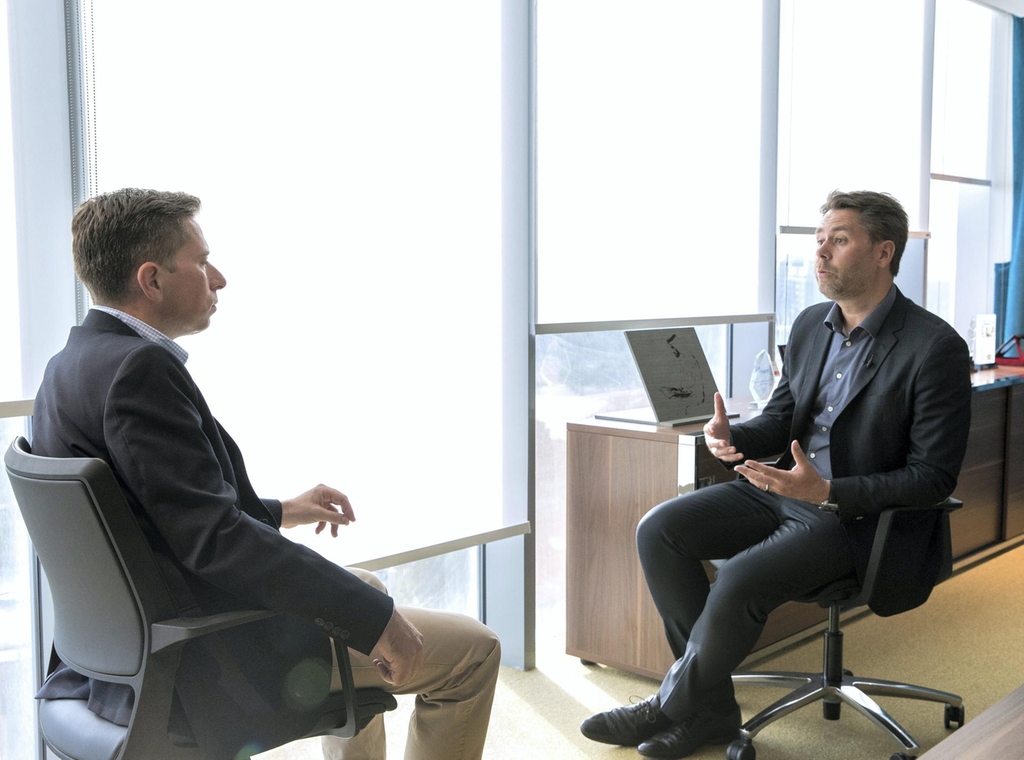Article

How Casper Klynge is reinventing diplomacy as the world's first tech ambassador
Denmark's representative in Silicon Valley has met with scepticism since taking up his post, but he is convinced others must follow his country's lead.
The internet has already changed the world faster than any previous technology. And we're only just getting going. In just a century we will go through the equivalent of the journey from cave paintings to nuclear weapons. Technology will transform how we meet our needs for peace, dignity and community. It gives the prospect of the world’s population having an instant, global and unfiltered means of communicating, consuming information, forming opinions, preferences and societies.
How humans manage this paradigm shift to a connected world is the greatest challenge of our era. Yet we are in danger of being overwhelmed. At a time when we have the tools to react globally, we are failing to use them. We have not begun to truly adapt our institutions to the new realities.
If we are in the foothills of a truly global, connected civilisation, where can we debate these challenges? The pace of technological change means that the internet has often been something that happens to the global architecture, not a force marshaled fully in support of our collective objectives.
Denmark has been a first mover in working out how to respond. Casper Klynge was appointed the country’s tech ambassador in 2017, the world’s first. Already an experienced diplomat, he is now pioneering a new diplomacy between tech and governments. After seven months in the job, I caught up with him at the offices of The National.
Tom: What exactly does a tech ambassador do?
Casper: It is about responding to important international trends. Big tech companies are now so powerful: the annual turnover of Apple is the same as Denmark’s GDP. That power can be transformed into political influence, a role similar to states. So we need diplomatic representation to deal with them. Technology will define who will be winners and losers in the next decade. We want to help humanity reap the benefits. My day is balanced between dealing with technology companies, countries and international organisations. I travel a lot – my mandate and my team are global.
Tom: How does that comparison look in 20 years from now? Is Apple going to be a bigger world power than Denmark?
Casper: If we don’t act, these companies will challenge governance in its traditional sense – not only Denmark. So this initiative is to exercise influence as a state, and to redefine the relationship between the private and public sector. Governments won’t be able to regulate because of the pace of change, but tech can’t self-regulate either. We need to work together.
Tom: Facebook, Cambridge Analytica. This is clearly a moment of self-reflection for tech. An idealistic industry is finding message boards filling with criticisms. Does dialogue go the other way? Will Microsoft send ambassadors to capitals? Will Google have a place on the UN Security Council?
Casper: Big companies have growing de facto presence in our capitals. But this is about bringing back diplomacy to its roots, and into the headquarters of these companies. Not only in Silicon Valley – also in Beijing, Hangzhou, Shenzhen, Europe. We press them to assume a responsibility proportional to their influence. How do we create a digital dividend, not a digital divide?
Tom: Is Silicon Valley a hardship posting compared to Afghanistan? How receptive are they?
Casper: I have been trying to convince my colleagues in Copenhagen that California is a hard posting. We hope other countries will follow. It is not easy: we have been met with scepticism about what we are trying to achieve. But once we explain the broad agenda, from cyber security to online terrorism, there is more interest.
Tom: Diplomats speak truth to power. You have tough conversations with the Googles and Facebooks. But what is your message to governments about how to engage global tech?
Casper: It cannot be monothematic or purely commercial. Advanced machine learning, artificial intelligence, biotechnology, gene-modifying: those are existential issues for countries. You don’t need a tech ambassador, but we do need a tech dialogue.
Tom: For you not to be the last tech ambassador, what does success look like?
Casper: Creating a coalition of other countries, international organisations, civil society and tech to really dig into these issues. Making the companies more accountable, more responsible. Applying traditional diplomatic tools to this new industry. And trying to talk the talk ourselves: to use new technologies for our humanitarian agenda, blockchain on fighting corruption, big data on migration flows. How do we prepare Danish society for the digital age?
Tom: Many of the rules to govern global politics were forged after the Second World War: the creation of the UN, the Universal Declaration of Human Rights. Can these rules keep up or will be need to start again as we balance liberty and security online?
Casper: That is the million-dollar question. Can we govern as the last 60 years? Can a Geneva Convention apply to a digital age where cyber-attacks are as damaging as conventional warfare? Big tech themselves are proposing new international norms.
Tom: You have been here meeting future tech ambassadors at the Emirates Diplomatic Academy, the Ministers for Artificial Intelligence and Happiness. What role can the UAE play in this ecosystem?
Casper: We have been impressed by the UAE's political vision in appointing the world’s first AI Minister. At the UN, we hope Denmark and UAE can cooperate on the big challenges. Diplomacy will have to be agile; adapt; think out of the box; build new partnerships.
Photo description and credit: Denmark's tech ambassador Casper Klynge at The National's offices in Abu Dhabi. Victor Besa / The National

